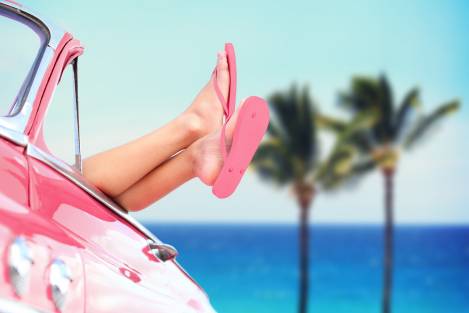
Written by Kayla Jane Barrie Updated on Mar 03, 2025 4 mins read

When it comes to driving, safety, and adherence to the law are paramount concerns. One question that often arises is whether driving barefoot in Ontario is legal and safe.
With various opinions and misconceptions surrounding this topic, let's investigate the matter and shed light on whether slipping off those shoes is a practical choice or a potential hazard that could lead to fines and increased car insurance premiums.
Who’s really pulling your leg – is driving barefoot illegal in Ontario? Find out below.
The short answer is yes, it is legal to drive barefoot in Ontario. The province's Highway Traffic Act does not specifically prohibit driving without shoes, leaving drivers with the flexibility to make this decision.
However, just because something is legal doesn't necessarily mean it's the safest option. While the law allows barefoot driving, it's essential to consider the potential implications for your safety and control behind the wheel.
Driving barefoot has many safety concerns associated with it. Here are the top reasons why driving barefoot is dangerous:
While there are no laws against driving barefoot in Canada, it is not a safe option. If your lack of footwear causes you to drive dangerously and get into a crash, you can be charged with careless driving.
To ensure safe driving, it's important to choose the right footwear. Avoid shoes that hinder your ability to feel the pedal or shift gears quickly. Closed-toe shoes like sneakers, boots, or rubber shoes are the best options for driving, as they provide excellent control over speed and braking. If you need to wear heeled shoes for work or an event, pack an extra pair of driving shoes.
Here are some tips to remember when driving with different types of shoes:
It’s not illegal to drive in flip-flops in Ontario, but it does pose additional dangers compared to comfortable, closed toe shoes. Flipflops and sandals lack adequate protection and grip, which can lead to an accident.
Driving barefoot being illegal is a myth – no laws say you can’t. Not driving in proper footwear can cause problems such as a limited range of motion and poor friction.
If you ride a motorcycle, it may not be against the law to drive barefoot but it definitely poses health and safety risks. If you are involved in an accident, you can do more harm to yourself and see an impact on your motorcycle insurance.
Although it is legal to drive barefoot in Ontario, it is not a decision to be taken lightly. While some drivers may argue for greater comfort or improved pedal sensitivity, it is essential to consider the possible safety risks related to this practice and how it may influence your Ontario car insurance. Above all, your safety and the safety of other drivers on the road should always be the primary concern.
| Categories | Auto |
|---|---|
| Tags | Driving Tips |
Read our insurance blog to get helpful tips, information and news.
Big changes are coming to Ontario car insurance. Starting July 1, 2026, many accident benefits will become optional. Learn how these "à la carte" reforms impact your coverage and why opting out could be a major financial risk.
Learn about Canada's new Electric Vehicle Affordability Program (EVAP). Discover how the $50,000 transaction rule works, which cars qualify, and how to claim your rebate.
Fatal collisions in Canada rose 9.14% from 2019 to 2023. Discover the latest road safety statistics, provincial rankings, and how these trends affect your auto insurance rates.
Find out if a seatbelt ticket will raise your car insurance rates and how insurers view seatbelt violations.